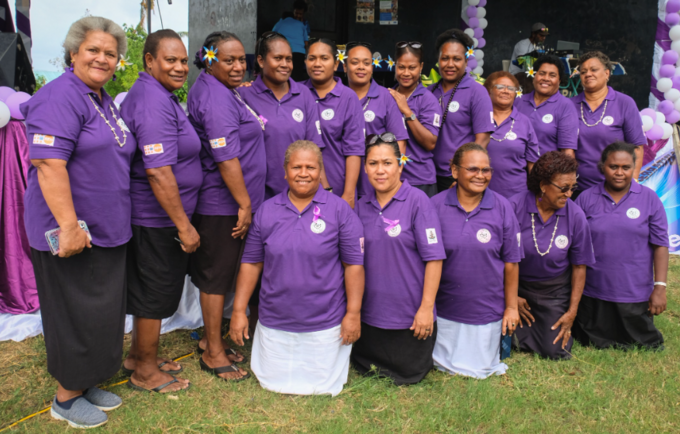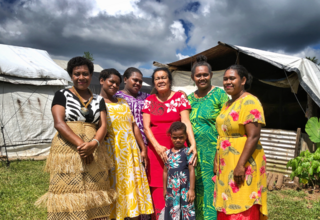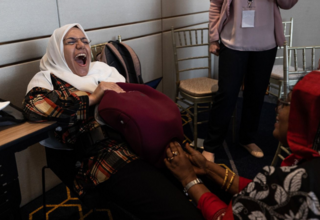PORT VILA, Vanuatu – When emergencies strike, women and girls are most vulnerable. Pregnancy-related deaths increase as essential sexual and reproductive health services become disrupted. Emergencies can also increase the risk of multiple forms of gender based violence. UNFPA’s humanitarian response moves quickly to protect the health and protection needs of communities in crisis.
UNFPA has been investing in training and maintaining a roster of retired midwives in Fiji and the region for humanitarian response. In January 2023, UNFPA trained a group of health professionals in Northern Fiji for stand-by emergency deployment. Just weeks later, in the aftermath of Tropical Cyclones Judy and Kevin, midwives Emily Q. Naiceru, Mereani Gavidi, Nanise S. Ratuvou, Esita Tuibua, and Kinisena Bolalevu were quickly mobilised to reinforce Vanuatu’s health workforce and strengthen lifesaving sexual and reproductive health (SRH) services.
Local midwives were the first responders in the islands hardest hit by the cyclones. Midwife Elizabeth William from Vanuatu, detailed the challenging circumstances in the early days of the emergency response. Her team travelled across treacherous roads in Tafea province, enduring harsh weather conditions to reach women and girls with prenatal care, assist delivery, provide emergency obstetric care and postnatal care for the mothers and their newborns.
“I met a mother who had given birth as the cyclone hit. Because of her remote location, she had to wait two weeks before she could receive medical care. Once she heard about our midwifery team, she courageously came to find us, and we provided much needed post-natal-care,” said Elizabeth.
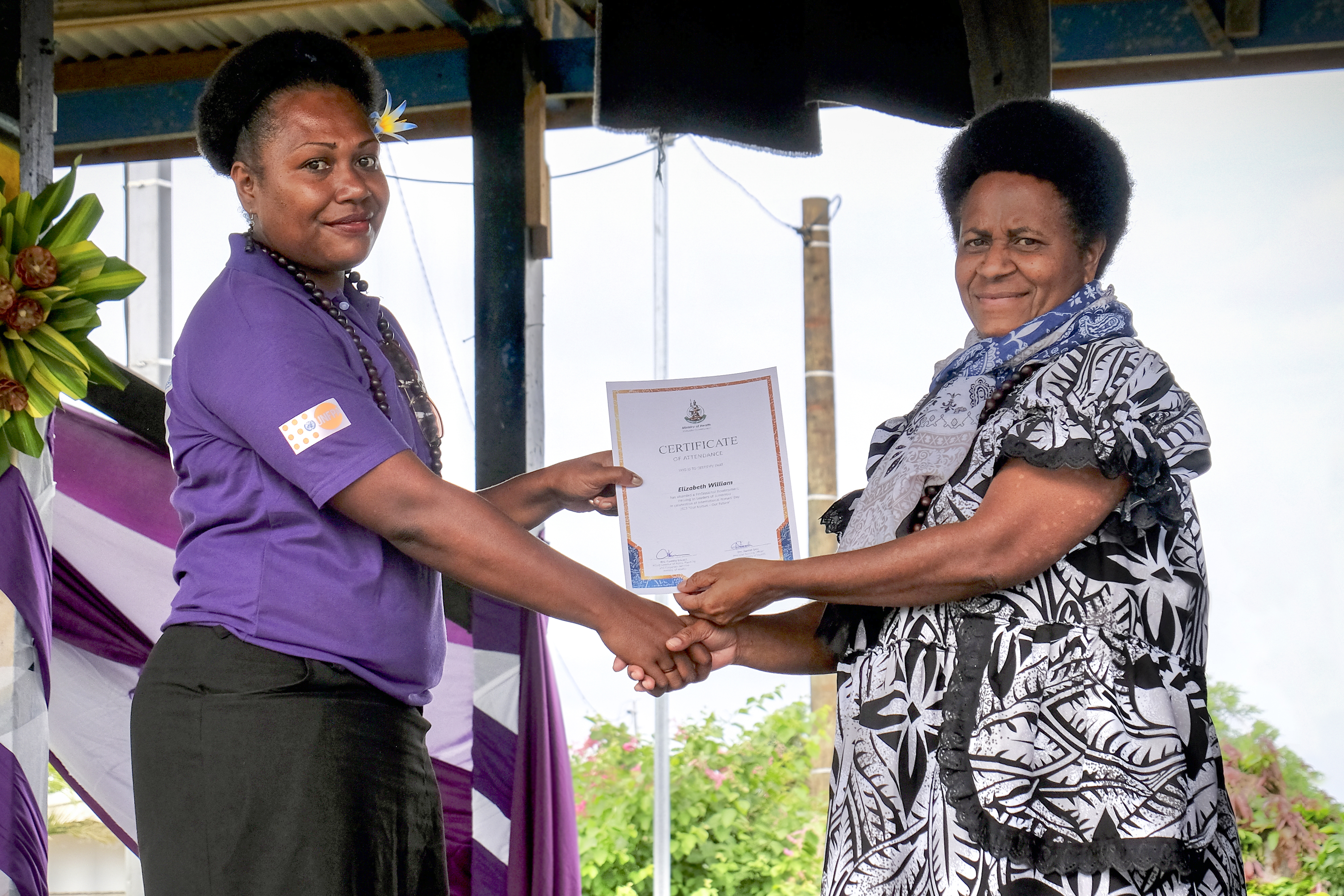
Transforming lives through education
When deployed to Epi Island, Fijian midwife Kinisena delivered an outreach session to adolescent girls at Burumba school. Kinisena discussed with the students the importance of menstrual health, and preventing teenage pregnancy. As Kinisena was distributing menstrual hygiene kits to the students, she noticed tears streaming down the face of one girl, Elisa, who was 15 years old, overcome with joy. She was so grateful for this information because no one had ever educated her about menstruation before. During her period, she would isolate herself and bathe in the river, worrying that something was wrong with her. Touched by Elisa's story, Kinisena reassured her that menstruation is a completely natural and healthy process, an integral part of a young girl's body changes as she transitions from childhood to adolescence and puberty, while empowering her with the knowledge and supplies that she needed to manage her menstruation.

Never missing and outreach opportunity
During their community outreach, Fijian midwives came across a migrant settlement from Tongoa and Futuna island, where the women and girls were in need of sexual and reproductive health services. They engaged 42 women and girls in a full day health awareness session on puberty, menstrual health, contraceptives, safe motherhood and gender-based violence. The women and girls were provided with dignity kits, including a special dignity kit for women & girls with disabilities. One week later, a mother from the settlement sought contraceptive services at the hospital – a testament to the power of community outreach health education.
Promoting safe motherhood
In addition to their community outreach work, the Fijian midwives demonstrated versatility and adaptability within health facilities as well. At Vila Central Hospital, they navigated between contraceptive services, the antenatal clinic, and the labour ward with seamless professionalism. Building strong relationships with patients and staff, they overcame language barriers by collaborating with local colleagues for interpretation. Central to their efforts was the promotion of safe motherhood. They spent significant time counselling mothers on the importance of birth spacing and the benefits of contraceptives — a conversation that holds significant implications not only for the women but also for their partners. They noted that, for many women, personal autonomy to make their own decision regarding contraception is often lacking. The consent of their husband or partner is considered essential to utilise long-term contraceptive methods, such as the Jadelle implant, which offers protection for up to five years.
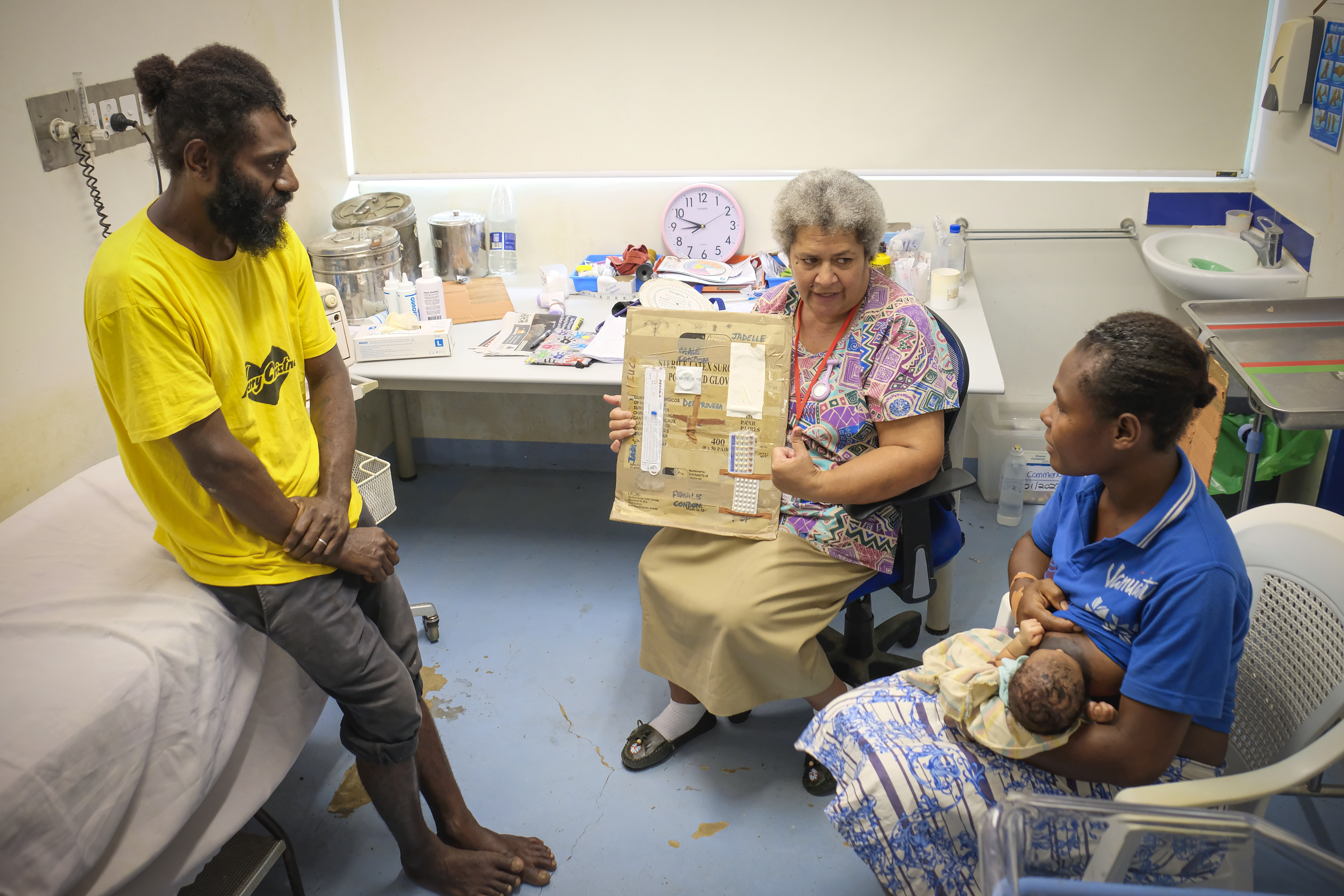
The Fijian midwifery team witnessed some of the barriers to sexual and reproductive health while based in Vila Central Hospital. They found that high costs often discouraged some women from fully utilising family planning services. Lack of knowledge and empowerment on rights-based approaches to family planning also played a role. To tackle these issues, UNFPA is actively supporting the Ministry of Health in the implementation of Family Life Education and targeted health promotion initiatives.
Despite these challenges, it is noteworthy that in 2022, 61% of the demand for modern contraceptive methods was met among women aged 15-49, showing a resilience and determination among women in Vanuatu to make informed choices about their reproductive health.
The midwives observed pregnant women presenting with decreased haemoglobin levels, a common sign of iron-deficiency anaemia. Vitamin and iron deficiencies can put women at very high risk for child birth, as normal levels of blood loss could be fatal for pregnant women and their infants. But there’s still much more to be done. Midwives — mostly women — are often underpaid and undervalued. Strengthening the midwifery workforce calls for investment in education and training, fair wages and a safe, supportive and respectful work environment.The midwives counselled their patients on the importance of nutrient rich local food and supplements during pregnancy. These health professionals also grapple with systemic issues like inadequate birth preparedness plans, a high rate of premature births, and availability of obstetric records from previous pregnancies. Their work has underscored the necessity for improved patient privacy, affordable healthcare, and comprehensive health education. These experiences highlight the urgent need for robust standard operating procedures, clearer guidelines, and further research on women's health during pregnancy.
During their two month deployment, the midwives reached 1,428 individuals with SRH and GBV services. They also conducted awareness, counselling, and information sessions for 6,394 individuals, including 5,866 individual one-to-one sessions and 528 group sessions.
Unity in healthcare
As the Fijian midwives' two-month assignment drew to a close, they joined their counterparts in Vanuatu for a march along Port Vila's waterfront on International Nurses Day. This event was not just symbolic; it was a testament to the unity they had fostered during their assignment and their shared commitment to enhancing healthcare in the region.
"Our deployment is about supporting the local workforce," said Emily, one of the Fijian midwives. "Language was a barrier, but with the local midwives' assistance, we overcame this challenge and ensured efficient communication.”
Sonia, another Fijian midwife, echoed this sentiment. "Filling the gap in our system's emergency preparedness requires unity and collaboration," she said. "We champion health services that are affordable, accessible, and universally available,” Emily added.
The work of these midwives extends beyond delivering babies. It encompasses empowering women, fostering resilient communities, and contributing to sustainable health systems that cater to everyone, especially the most vulnerable in the Pacific region. Their efforts embody the spirit of UNFPA's mandate: to ensure every pregnancy is wanted, every childbirth is safe, and every young person's potential is fulfilled.
